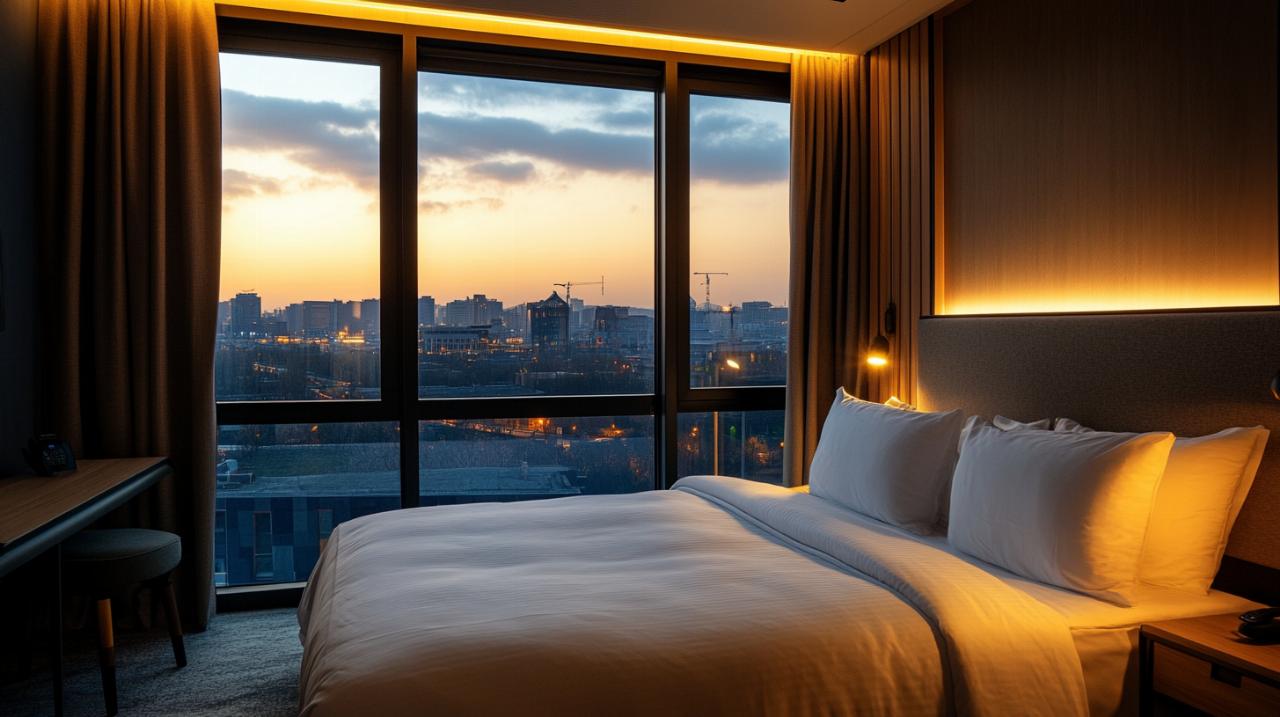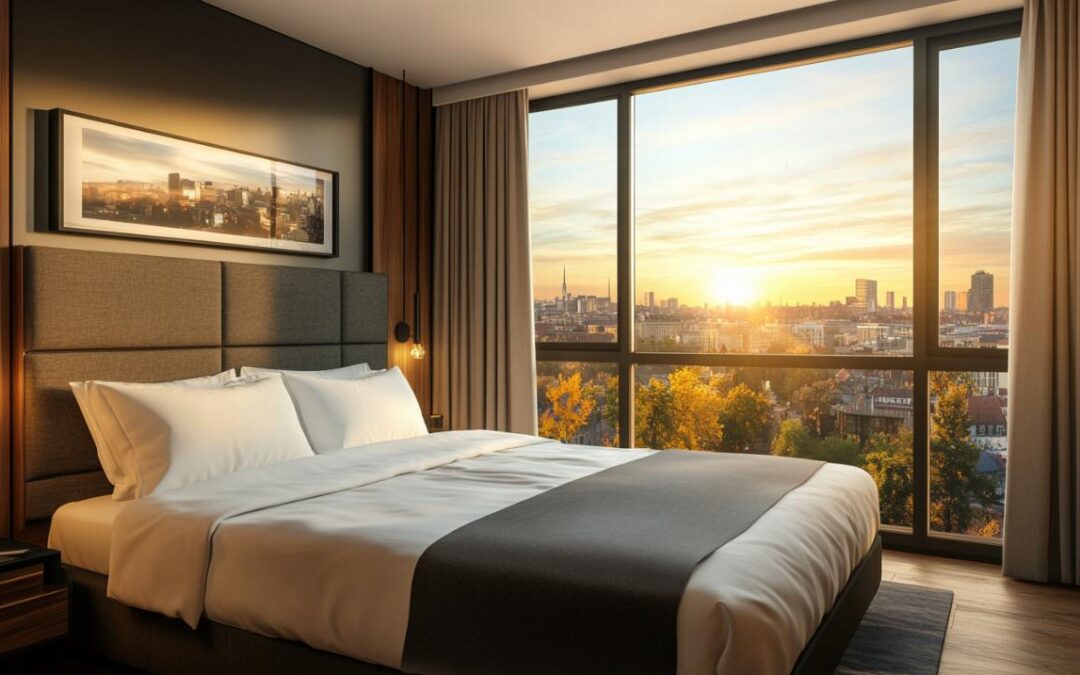When planning your next adventure, finding the perfect place to stay can make or break your travel experience. Whether you're looking for a luxury resort, a cosy bed and breakfast, or a budget-friendly hostel, knowing how to navigate the vast sea of accommodation options is essential. This comprehensive guide will walk you through everything you need to consider before making that all-important booking decision.
Establishing your accommodation budget
Before you begin scrolling through endless accommodation listings, it's crucial to determine exactly how much you're willing to spend on your digs. The Hotel Essidi best accommodation experts recommend allocating about 30% of your overall travel budget to where you'll sleep, but this can vary significantly depending on your destination and travel style.
Setting spending limits for different trip durations
For shorter city breaks lasting just a weekend, you might justify splashing out a bit more per night since the overall accommodation cost remains relatively manageable. Conversely, for longer adventures spanning several weeks, you'll want to be more conservative with your nightly rate to avoid depleting your funds too quickly. Many experienced travellers suggest creating a sliding scale where the per-night budget gradually decreases as the trip length increases.
Balancing accommodation costs with other travel expenses
Your accommodation doesn't exist in isolation from other travel expenses. If you're visiting a city with excellent public transport, you might choose to spend more on centrally-located lodging and save on taxi fares. Similarly, choosing a place with kitchen facilities might cost more upfront but could save you significant money on restaurant meals. Consider all these interconnected costs when setting your accommodation budget rather than viewing it as a standalone expense.
Choosing the perfect location
Location often proves to be the most critical factor in your overall satisfaction with your accommodation choice. Even the most luxurious hotel can feel disappointing if it's miles away from everything you want to see and do during your trip.
Weighing up city centres versus quieter neighbourhoods
City centre locations typically command premium prices but offer unbeatable convenience for sightseeing and dining out. They also tend to have better transport connections, reducing the time spent travelling during your precious holiday hours. Quieter residential neighbourhoods, while requiring a bit more travel time, often provide a more authentic local experience and significantly better value. They can also offer welcome respite from the noise and bustle after a busy day of exploration, allowing you to experience how locals actually live rather than just the tourist facade.
Accessibility to transport links and local attractions
Look beyond the headline distance from major attractions and consider the practical reality of getting around. A hotel that's technically two miles from a famous landmark might actually be more convenient than one that's one mile away if the former sits right next to a metro station. Study local transport maps carefully, and consider factors like night bus routes if you plan on enjoying the local nightlife. Many booking platforms now include information about nearby transport options, making this research easier than ever.
Navigating through online reviews
In today's digital age, fellow travellers' experiences provide invaluable insights when choosing accommodation. However, not all reviews are created equal, and learning to interpret feedback effectively is an essential skill for the modern traveller.
Spotting genuine feedback from fellow travellers
Look for detailed reviews that mention specific experiences rather than vague statements. Genuine reviewers typically include both positive and negative aspects of their stay, making their assessment more balanced and trustworthy. Be wary of reviews that sound overly promotional or those that seem unreasonably negative without specific examples. Recent reviews should also carry more weight than older ones, as management, staff, and facilities can change significantly over time.
What to look for in accommodation ratings
Rather than focusing solely on the overall rating, dig into the specific categories that matter most to you. If you're a light sleeper, prioritize reviews mentioning noise levels. Working remotely? Pay special attention to Wi-Fi reliability comments. Also consider the volume of reviews; an accommodation with 500 reviews and a 4.2 rating might be a safer bet than one with a 4.8 rating but only ten reviews. The former provides a more statistically significant picture of what you can expect.
Comparing different types of accommodation
The accommodation landscape has evolved dramatically in recent years, with traditional hotels now competing with a vast array of alternative options. Each type offers distinct advantages and potential drawbacks worth considering.
Pros and cons of hotels, holiday rentals and hostels
Hotels excel in convenience and service, providing amenities like daily housekeeping, 24-hour reception, and often on-site dining options. However, they typically offer less space for your money and can feel somewhat impersonal. Holiday rentals through platforms like Airbnb provide more space, kitchen facilities, and a local feel, but often lack services and may involve complicated check-in procedures. Hostels remain the budget champion, offering remarkably affordable beds and excellent social opportunities, though privacy is limited and facilities are basic. Each option represents a different balance of cost, comfort, space, and service.
Which options suit different types of travellers
Business travellers generally benefit from hotels' predictability and services, while families often find holiday rentals provide better value and practical features like separate bedrooms and kitchen facilities. Solo adventurers seeking social connections might prefer hostels or guesthouses where communal areas facilitate meeting fellow travellers. Longer stays generally tip the balance toward rental properties, as the cost savings and homely comforts become more valuable over extended periods. Your personal priorities will ultimately determine which type of accommodation represents the best value for your specific needs.
Essential amenities to look for
 Beyond the basic provision of a bed, the amenities offered by your accommodation can significantly impact your overall travel experience. Identifying which facilities are genuinely important to you can help narrow down your options.
Beyond the basic provision of a bed, the amenities offered by your accommodation can significantly impact your overall travel experience. Identifying which facilities are genuinely important to you can help narrow down your options.
Must-have facilities for comfortable stays
Reliable Wi-Fi has become non-negotiable for most travellers, whether for staying connected with loved ones, planning daily activities, or even working remotely. Climate control appropriate to the destination—be it effective air conditioning in tropical locations or proper heating in colder climes—ranks similarly high on the priority list. Bathroom preferences vary widely, with some travellers insisting on ensuite facilities while others are content with shared options if it means significant cost savings. Storage space, particularly secure storage for valuables, also deserves consideration, especially for longer stays.
Extras worth paying more for
Certain premium amenities can justify higher rates if they align with your travel style. A swimming pool might seem like a luxury until you're visiting a scorching city in midsummer, when it becomes a welcome respite. Similarly, on-site parking in cities with challenging driving conditions can save both money and considerable stress. Breakfast inclusion merits careful calculation—sometimes it represents excellent value, while in other cases, you might enjoy both better quality and lower costs at local cafés. Consider which extras would genuinely enhance your specific trip rather than automatically paying for premium features you may rarely use.
Matching accommodation to your travel style
Your personal travel philosophy should heavily influence your accommodation choices. The perfect stay for a luxury-seeking couple will differ dramatically from ideal lodgings for an adventure-focused backpacker.
Luxury versus value options across different destinations
The definition of luxury varies enormously across different countries and regions. In Southeast Asia, five-star luxury might be surprisingly affordable, while in major European capitals, even mid-range accommodation commands premium prices. Smart travellers research what constitutes good value in their specific destination rather than applying universal expectations. Sometimes, the best strategy involves mixing accommodation types—perhaps splurging in cities where quality budget options are scarce, then economising in destinations known for excellent affordable lodgings.
Family-friendly versus solo traveller considerations
Families typically prioritise space, safety features, and perhaps kitchen facilities or swimming pools to keep children entertained. Solo travellers might value social spaces, central locations, and security features that provide peace of mind when returning alone at night. Couple travellers often seek romantic touches and privacy, while friend groups need configurations that allow both socialising and sufficient personal space. Being honest about your travel group's genuine needs rather than what you think you should want leads to more satisfying accommodation choices.
Making the Most of Booking Platforms
The proliferation of online booking platforms has revolutionised how we find and reserve accommodation, but navigating these tools effectively requires some know-how.
Top comparison sites for finding deals
Major aggregator sites like Booking.com and Expedia offer vast selections and often exclusive deals, but don't overlook specialised platforms that cater to specific accommodation types. Sites like Hostelworld excel for budget options, while luxury travellers might find better curation on boutique platforms like Mr & Mrs Smith. Consider checking multiple sites for the same property, as prices and inclusions can vary significantly. Also remember that booking directly with the accommodation after finding it on a comparison site sometimes yields better rates, room assignments, or added perks as the property saves on commission fees.
Timing your booking for the best rates
Accommodation pricing follows complex algorithms based on demand, with rates fluctuating daily and even hourly. For popular destinations during peak seasons, early booking typically secures the best rates and widest selection. Conversely, last-minute deals can offer exceptional value for flexible travellers during shoulder or off-seasons. Setting price alerts on comparison sites allows you to monitor rate changes for properties you're interested in, potentially saving significant money by booking when temporary price drops occur. Being flexible with your exact travel dates, even by just a few days, can also reveal substantially better rates.
Protecting your booking with insurance
Even the most carefully planned trips can encounter unexpected complications, making appropriate insurance coverage a wise investment rather than an optional extra.
What good travel insurance should cover
Comprehensive travel insurance should include accommodation-related protections such as coverage for pre-paid, non-refundable bookings if you need to cancel your trip for covered reasons. Look for policies that also cover alternative accommodation costs if your original booking becomes uninhabitable or if the provider goes bankrupt before or during your stay. Some premium credit cards offer limited travel protections when you use them for bookings, but these rarely provide the comprehensive coverage of a dedicated travel insurance policy. Always read the fine print regarding accommodation-specific coverages rather than assuming standard protections.
Dealing with unexpected accommodation issues abroad
If you arrive to find your accommodation significantly different from what was advertised, document the discrepancies immediately with photos and written notes. Contact the booking platform's customer service team promptly, as many offer 24-hour assistance and can help mediate disputes or find alternative accommodation. For serious issues affecting health or safety, don't hesitate to relocate first and seek compensation afterwards. Keep all receipts for additional expenses incurred, as these will be essential for insurance claims. Having digital copies of all booking confirmations, correspondence, and a basic understanding of local consumer protection laws can prove invaluable when resolving accommodation problems away from home.

